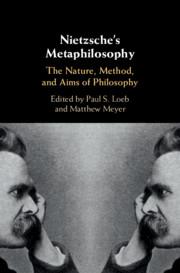Book contents
- Nietzsche’s Metaphilosophy
- Nietzsche’s Metaphilosophy
- Copyright page
- Contents
- Contributors
- Acknowledgments
- Note on Texts, Translations, and References
- Abbreviations
- Introduction
- Part I Evolving Metaphilosophies
- Part II The Nature of Philosophy
- Part III The Method of Philosophy
- Chapter 7 Nietzsche’s Affective Perspectivism as a Philosophical Methodology
- Chapter 8 Nietzsche’s Philosophical Naturalism
- Chapter 9 Nietzsche’s Moral Methodology
- Part IV The Aims of Philosophy
- Bibliography
- Index
Chapter 9 - Nietzsche’s Moral Methodology
from Part III - The Method of Philosophy
Published online by Cambridge University Press: 24 October 2019
- Nietzsche’s Metaphilosophy
- Nietzsche’s Metaphilosophy
- Copyright page
- Contents
- Contributors
- Acknowledgments
- Note on Texts, Translations, and References
- Abbreviations
- Introduction
- Part I Evolving Metaphilosophies
- Part II The Nature of Philosophy
- Part III The Method of Philosophy
- Chapter 7 Nietzsche’s Affective Perspectivism as a Philosophical Methodology
- Chapter 8 Nietzsche’s Philosophical Naturalism
- Chapter 9 Nietzsche’s Moral Methodology
- Part IV The Aims of Philosophy
- Bibliography
- Index
Summary
Nietzsche is widely reputed to have a novel approach to moral philosophy. Georg Simmel called him the “Copernicus of philosophical ethics,” presumably intending to convey by this that Nietzsche recentered the perspective from which philosophical ethics is conducted (Simmel 1992: 124). And Nietzsche himself agreed: “I hope people forgive me the discovery that all moral philosophy so far has been boring” (BGE 228),1 he writes, and presents himself as offering a new approach. His “project is to traverse with quite novel questions, and as though with new eyes, the enormous, distant, and so well-hidden land of morality – of morality that has actually existed, actually been lived; and does this not mean virtually to discover this land for the first time [GM P:7]?” The project of philosophical ethics must be rethought: it must be conducted in a different way, employ different methods, and pursue different aims.
Keywords
- Type
- Chapter
- Information
- Nietzsche's MetaphilosophyThe Nature, Method, and Aims of Philosophy, pp. 165 - 184Publisher: Cambridge University PressPrint publication year: 2019
- 2
- Cited by

